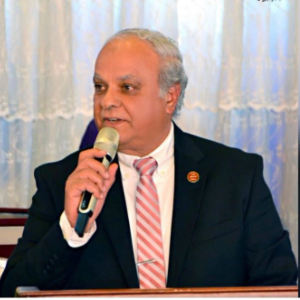Title : The role of reduce graphene oxide content on the adsorption enhanced photocatalysis and antibacterial activity of reduced graphene oxide/ bismuth tungstate nanocomposites
Abstract:
One of the main health issues of modern times is the lack of access to clean drinking water. Industrial dyes are among the most prevalent substances that make water dangerous to drink. Among these dyes, methylene blue (MB) and rhodamine B(RhB) are the most dangerous for both the natural environment and human health. Semiconducting-based heterogeneous photocatalysis generates high redox power charge carriers under solar illumination, making it a successful approach for cleaning wastewater from pollutants. Consequently, nanocomposite catalysts have a stronger capacity to catch light, strong redox capabilities, and a range of oxidation and reduction sites. The current work uses a simple solvothermal approach to generate a novel nanocomposite photocatalyst, rGO/Bi2WO6. Many analytical and spectroscopic approaches involving powder X-ray diffraction (XRD), scanning electron microscopy (SEM), energy dispersive X-ray spectroscopy (EDS), photoluminescence (PL), X-ray photoelectron spectrometer (XPS}, Fourier-transform infrared spectroscopy (FT-IR), transmission electron microscopy (TEM), and UV-vis diffuse reflectance spectroscopy (DRS) were used to characterize the synthesized solar light-driven nanocomposites. The oxidation of MB and Rh B dyes in the presence of solar light was used to assess the photocatalytic efficiency of the rGO/ Bi2WO6 combination. In addition, the effects of catalyst loading, starting substrate concentration, rGO content, and reaction pH were investigated. The photocatalytic activity of the generated catalyst was also compared to that of bare Bi2WO6 under ideal conditions. Under visible light irradiation, the addition of rGO increases the degradation efficiency of MB and Rh B, with the most favorable findings obtained with 10rGBi2WO6 calcined at 250 oC. After 30 minutes of exposure, the synthesized nanocomposites in the visible area showed good photodegradation percentages of 100.0% and 87.6% for MB and RhB dyes, respectively. Furthermore, the higher photocurrent responsive intensity and lower arc radius of electrochemical impedance of rGO/Bi2WO6 compared to Bi2WO6 revealed a synergistic effect on Bi2WO6 visible light responsiveness. Electrochemical impedance spectroscopy (EIS) and cyclovoltammetry (CV) were used to evaluate the electrochemical characteristics of the synthesized materials. According to the findings, rGO/Bi2WO6 has the lowest charge-transfer resistance and the largest specific capacitance. The improved photocatalytic activity of rGO/Bi2WO6 is due to the synergistic action between rGO and Bi2WO6 that induces the separation of photo-generated charge carriers. Based on these observations, a viable degradation pathway for MB and RhB dyes was proposed. 10rGBi2WO6 demonstrated excellent charge separation, stability, reusability, and photocatalytic activity. Furthermore, the antibacterial efficacy of gram-positive Bacillus subtilis and gram-negative Escherichia coli bacteria was found to be around 96.5% and 86.3%, with corresponding zones of inhibition measuring 21 and 19 mm, respectively.




